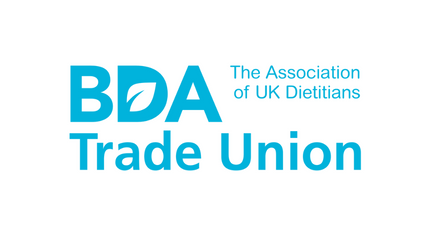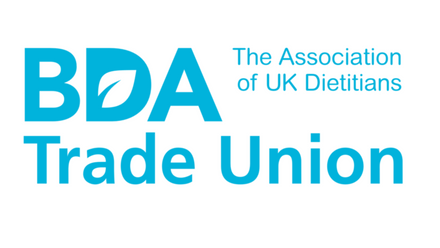The BDA Trade Union has responded to the recent Government consultation on a separate pay spine for nurses in the NHS. We oppose the proposal as we believe it goes against the ethos of Agenda for Change, which was implemented to ensure that all non-medical staff receive equal pay for work of equal value.
The consultation has now closed and we are happy to share with you our consultation responses.
Is there any evidence to suggest that the current AFC pay structure is creating issues for the career progression and professional development of nursing staff in the NHS?
The British Dietetic Association (BDA) is the professional body and trade union representing registered dietitians and the dietetic support workforce. Dietitians work across the NHS as an intrinsic part of the multi-disciplinary team approach, delivering expert, evidence based clinical advice and treatment to patients across a range of specialisms, including critical care, paediatrics, oncology, and mental health both in hospitals and in the community.
The dietetic workforce face similar problems with career progression and professional development to that experienced by nurses which is negatively impacting upon recruitment and retention along with causing issues with low morale.
Career Progression
Agenda for Change was introduced in order to facilitate equal access to career progression and personal development for all staff. However, over the years some structural issues have been identified which have become disincentives for those wishing to progress:
- The starting salary for a newly qualified dietitian is too low at band 5 and should be increased in order for the profession to become an attractive career option.
- Gaps between pay bands are too narrow and do not provide enough financial incentive to progress.
- Progression into leadership roles beyond band 7 are severely impeded by both the loss of overtime pay and unsocial hours payments and the small difference in pay between the top of band 7 and the bottom of band 8a (currently £896). This results in staff taking on much higher levels of responsibility for no real financial reward.
- There are no job profiles above band 7, including consultant and leadership roles for dietitians and none exist for the dietetic support staff, which is unique amongst the AHP workforce.
- The job evaluation scheme is not properly funded and many trusts do not have enough trained evaluators or the resource to fund any uplifts resulting from job evaluation. This is resulting in evaluation requests being blocked or severely delayed. The impact of this is that many members of the dietetic workforce are working with job descriptions that are not fit for purpose and do not reflect their current roles and responsibilities accurately. Urgent action is required to address this in order to benefit all professions including nursing and AHPs.
Learning and development
- Adequate levels of CPD are critical to the skill development of the dietetic workforce in order to provide the best possible care and treatment of patients. The science and practice of dietetics is constantly evolving and it is essential that dietitians are up to date on developments.
- Opportunities to undertake CPD are becoming increasingly difficult to access due to short staffing and a lack of flexibility and funding. Protected time for learning and development is a priority policy for the BDA.
- Preceptorship programmes should be available to all newly qualified dietitians. The move from being a dietetic student to autonomous confident practitioner can be challenging. New graduates need support and guidance to further develop and consolidate their skills and aid this transition.
Is there any evidence to demonstrate that issues with career progression and professional development are impacting the recruitment and retention of nursing staff in the NHS?
The BDA cannot provide and answer specific to the nursing profession. However, points make in the previous answer apply to this point across all professions including dietetics.
To what extent could existing AFC arrangements accommodate changes to the nursing profession, including changing responsibilities within roles and the introduction of new nursing roles?
Partially.
Please explain your answer and provide any evidence you have to support your views.
A review and refresh of Agenda for Change is overdue and would benefit all NHS professions. There are existing arrangements that are inadequately and inconsistently utilised that if properly resourced and implemented would accommodate changes to the nursing profession alongside any necessary changes to dietetics and other allied health professions:
- Adequate resourcing of job evaluation with funding for re-evaluated roles.
- Job evaluation group continuation of role profile reviews for nursing and other roles.
- Annual reviews of job descriptions and speedy consequent re-evaluation processes.
Is there any evidence to suggest that issues with career progression and professional development in the NHS are unique to nursing, and would therefore require a solution that is exclusive to nursing?
No.
Please explain your answer and provide any evidence you have to support your views.
The BDA is not aware of any such issues that are exclusive to the nursing profession. As outlined in previous answers, all NHS professions are experiencing similar difficulties in accessing professional development opportunities and career progression. CPD time should be protected for all registered professions as there are requirements to complete and stay up to date for the purposes of registration. All health professions must undergo professional development in order to provide the best possible care and treatment of of patients and there is not exclusivity for any single profession. The barriers contained within the current Agenda for Change pay scales are not unique to nursing, they apply to all and should be addressed so as to apply equally to all.
Do you think that the introduction of a separate nursing pay spine would improve the career progression and professional development of nursing staff?
No.
Please share any relevant experiences or evidence to support your views?
The BDA does not believe that there is any evidence to support that removing nurses from Agenda for Change would improve career progression and/or professional development for the profession. The problems that have been identified in previous answers apply equally to the dietetic profession and other AHPs. A wholesale review of current arrangements should be undertaken with a view to making improvements for all staff. Setting up an entirely new pay system for nurses along with a necessary new job evaluation scheme, would be costly, time consuming and has the potential to have a detrimental effect on nursing careers. The resources and funding that would be required would be better spent and much more cost effective if used to review the current system for all staff and to provide equality of pay, reward and recognition.
Do you think there are any additional benefits to introducing a separate nursing pay spine that are not directly related to career progression and professional development?
No.
Please share any relevant experiences or evidence to support your views.
There are no benefits to introducing a separate pay spine for nursing. The proposal to develop a separate pay spine for nurses in the NHS is totally unacceptable to the BDA and goes against the ethos of Agenda for Change which was implemented in order to ensure that all non-medical staff receive equal pay for work of equal value and that the contribution of all receives proper recognition. This is a costly and divisive proposition which carries significant risk.
Agenda for Change was developed and implemented in partnership with employers and trade unions and that model of partnership working continues to this day. This proposal risks causing division between the constituent parties which can only result in detriment to the pay and working conditions of NHS staff. Trade Unions including the BDA are willing to work together with employers through the mechanism of the NHS Staff Council in order to facilitate any necessary revision to Agenda for Change that would benefit all staff equally without unnecessary costs.
The introduction of separate pay arrangement for one profession will cause division amongst staff who work alongside each other in multi-disciplinary teams which in turn will have a detrimental effect on morale and retention. The ambition of mitigating a large volume equal pay and equal value claims brought about by the introduction of Agenda for Change will not be realised. In fact, it is highly likely that mass claims will be brought on behalf of members by the trade unions, the cost of which could be extremely high and potentially unaffordable. All NHS professions require investment and to spend valuable resources on funding the implementation of a new system and consequential equal pay claims is totally unacceptable at a time when the NHS is facing a funding crisis.
Do you think that there would be risks or potential unintended consequences of separating nursing staff form the current AfC pay arrangements?
Yes.
Please share any relevant experiences of evidence to support your views.
Significant risks have been outlined in the previous answer. However, BDA members are extremely upset and concerned about the possibility of one profession being removed from the collective arrangements that currently apply to all professions. The contact that we have had from our members is showing a great deal of anger as they now feel that as highly trained and specialist health professionals, they are not receiving the same level of recognition as nursing colleagues. This will inevitably lead to low morale and a decrease in productivity. There is a strong possibility that members will want to enter into dispute and consider industrial action ballots.
Do you agree or disagree with the principle of introducing a separate pay spine exclusively for nursing staff?
Disagree.
Options for the design of a separate nursing pay spine:
Option 1 - introduce a separate nursing pay spine within the existing AfC contract.
If we introduced a separate nursing pay spine within the existing AfC contract:
• all non-medical staff would remain on the same wider set of terms and conditions (covering matters such as annual leave, sickness absence and pay enhancements)
• there would be 2 pay spines within the AfC contract: one for nursing staff and one for other AfC staff.
• the JES would continue to apply to both pay spines, meaning that nursing roles would continue to be evaluated against other AfC roles to ensure that equal pay was maintained.
• the NHS Staff Council would retain responsibility for the AfC contract.
What would be the benefits, if any, of option 1?
The BDA cannot see any benefits to option 1.
What would be the challenges and wider implications, if any, of option 1?
This option would be unworkable and could lead to the dismantling of Agenda for Change and the following challenges would be difficult, if not impossible to overcome:
- The wider terms and conditions would need significant revision with sections separated out for nurses and other staff.
- It is difficult to see how the JES could apply to both spines equally. In the event that a dietetic role and a nursing role scored equally under the scheme then the same pay should apply. If a separate pay spine has higher value pay rates attached to the pay points with the same JE scores, then equal pay claims would be the result.
- The establishment of a separate pay spine would require unnecessary bureaucracy.
- There would be a potential for industrial action.
- Other professions may feel that they should have their own pay spines which would further exacerbate the inevitable disharmony amongst existing teams, leading to low morale and reduced productivity.
Option 2 - introduce a separate nursing pay spine as part of a new contract for nursing staff.
If we introduced a separate nursing pay spine as part of a new contract for nursing staff:
• a new national contract would be negotiated for nursing staff.
• this would include a pay spine, a mechanism for determining levels of pay, as well as a wider set of terms and conditions.
• new contractual arrangements would need to ensure that pay equity continued to apply across the NHS workforce, and that there was a robust structure in place to support progression criteria for a new pay spine.
• the NHS Staff Council would retain responsibility for the AfC contract; however, a new national collective bargaining structure would be needed to take responsibility for the new nursing contract.
What would be the benefits, if any, of option 2?
The BDA can see no benefits to option 2.
What would be the challenges and wider implications, if any, of option 2?
- A new pay review body would be required.
- New local collective bargaining and consultation mechanisms would need to be set up.
- Reaching agreement on a new contract would be difficult as this would need to involve unions with nurses in membership besides the RCN,
- Significant resource and bureaucracy would be required.
- There is a risk of an increase in the pay bill which could negatively impact on the Agenda for Change staff.
- Equal pay cases with staff on Agenda for Change.
- The collective trade unions are unlikely to agree a separate pay spine.
- Destabilising or dismantling of Agenda for Change.
- Other professions may call for new contracts in the future.
- Risk of industrial action.
If a separate nursing pay spine were introduced, which option would you prefer?
No preference – neither option would work.
Please explain your answer
There are no benefits to either option for any NHS staff or profession, NHS resources and funding, or importantly, patient care. The BDA is opposed to the proposal in its entirety for all of the reasons previously outlined. It is unworkable, unaffordable, unfair and divisive.
Are there any adjustments that could be made to the existing AfC pay structure, or any existing flexibilities within AfC that could be used more effectively, to address any issues you have identified in the previous sections?
The structural issues identified in previous sections should be addressed so that pay is not a disincentive to career progression. The gap between the top of bands 7 and 8a needs urgent attention including the payment of overtime and unsocial hours payments. Other issues include the narrow differential between pay points and bands. Promotion should result in a meaningful pay rise to reflect the additional responsibilities and skill required. A review of the current pay system contained within Agenda for Change should be undertaken by the NHS Staff Council as soon as possible to take into account barriers to progression and any equal pay risks.
Are there other measures that could be considered to support any issues you have identified in previous sections?
The JES requires improvement. There is an urgent need for more investment in funding and training not only to address the current backlog in evaluations but to maintain a robust framework for maintaining the scheme and its processes. All job descriptions should be subject to regular review so that they accurately reflect the work undertaken by staff. Building capacity in JE would improve retention across all professions including dietetics and nursing. There is an inconsistency of approach to JE across different employers with some staff facing blocks when requesting review and updating of job descriptions. Job matching is poorly and inconsistently reported and many BDA members are working to outdated job descriptions. We would recommend more standardisation of job descriptions where appropriate. The BDA supports the current work of the Job Evaluation working group and urge the Government to implement the forthcoming recommendations with full funding. There should be a review of job profiles with additional ones being developed in partnership with trade unions as identified. The annual appraisal process should be monitored to ensure that all staff receive meaningful assessment and support. This should include a review of job descriptions and an individual CPD plan.
Is there any evidence of effective solutions that are currently in place within the NHS to support the issues you have identified in previous sections?
Yes.
Please explain our answer and provide any evidence you have to support your views.
There are good and not so good examples across the NHS. The good examples usually come about as a result of partnership working and include:
- Protected learning time agreements
- Flexible working arrangements
- Preceptorship programmes
- Good induction programmes
- Mentoring and support for career progression and development.





